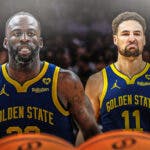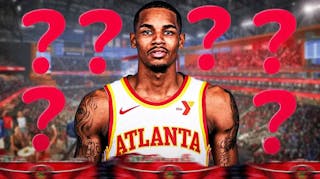Draymond Green is partly unhappy with the new collective bargaining agreement that was recently approved by the owners, which is expected to be ratified by the players within the next three weeks.
The Golden State Warriors forward wasn't so much upset for himself, but for other players, stressing two key points to his disappointment, according to Dan Feldman of CSN Bay Area:
- He’s not complaining on behalf of himself. He doesn’t believe he should earn more – and even indicates he, as a star, should earn less.
- He has no issue with the Basketball Related Income split. Owners and players will continue to split revenue about 50-50.
“It’s about me being frustrated for other guys. When we go in these negotiations, guys are overlooked,” Green told Anthony Slater of the San Jose Mercury News. “I think it’s more about helping these guys be in better standing than what it is for an All-Star or top two or three guys on a team. Those guys will always be taken care of.
It’s not even necessarily that it’s a higher minimum salary. There could be different structure to have not as many minimum players. Right now, there’s like a max and a minimum and a couple in between. I think there could be different structures to help those minimum guys make more and not be a minimum player.
Because without all 15 guys, yeah, you can be an All-Star, you can be a nice player. But without these guys, you can’t practice, you can’t get a sub, you can’t go through 82 games playing 48 minutes a game. If you get hurt, nobody’s there to step in for you. Every guy matters and I think every guy should be taken care of in the grand scheme of things.”
The Warriors benefitted this offseason by being able to sign multiple players to minimum contracts, the likes of David West and JaVale McGee, two players that are constant helping bodies off the bench.
“My complaint is not one of everybody is not making a good living. It’s that there is a good living in this for everyone, but for some it can be better,” said Green. “How do we help elevate those guys who are on the lower end of the totem pole? I think that should always be a focus. That’s my argument. It’s not to come off as everybody is not living good. No. You’re living pretty good if you’re in the NBA. I don’t want someone to look at me and say that I am inconsiderate about everyone else’s life outside the NBA. I grew up in a household where my mom made $16,000 a year. I know the struggle. I know how to keep those things in perspective and I do keep it into perspective. But I do look at things in a business standpoint and I do understand how much money is going around the NBA on a year to year basis. Within that realm of how much money is going around, you can elevate those guys.”
“I don’t want to be this guy that tries to raise this awareness that makes us go into a lockout and makes fans miss a game. I don’t think that’s always necessary either. At the same time, I think some guys in this league can be better taken care of. I want to be a voice for them. To help them be better taken care of.”
Green's argument is not one of “let's get more money for everyone,” but one to balance out the extremes between maximum and minimum contracts — so those who are solid contributors to NBA teams can make a salary worthy of their skills and influx on the franchise.
The new CBA has also created 60 new jobs in the way of two-way contracts, where players assigned to the D-League can now earn NBA-type money when called up to play for an NBA team instead of their reduced D-League salary.
The “over 38” provision is also considered an improvement of the current “over 36” one, which is another check mark for both players and owners to agree on.
Green's point is more of a call to awareness than a call to action, given how players and owners have had to make slight concessions to come up with a tentative bargaining agreement. Those rough edges are likely to be polished in the next CBA, given as to how this one is all but written in stone.




